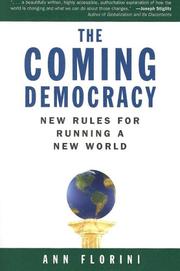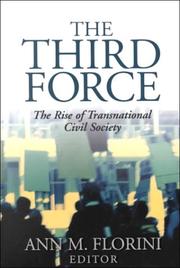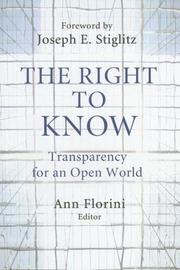| Listing 1 - 5 of 5 |
Sort by
|

ISBN: 0815728654 1559632895 1597268461 1423707885 9781423707882 9781597268462 9781559632898 Year: 2003 Publisher: Washington, DC Island Press
Abstract | Keywords | Export | Availability | Bookmark
 Loading...
Loading...Choose an application
- Reference Manager
- EndNote
- RefWorks (Direct export to RefWorks)
International economic relations --- Political systems --- Civil society. --- Democracy. --- Globalization. --- Global cities --- Globalisation --- Internationalization --- International relations --- Anti-globalization movement --- Self-government --- Political science --- Equality --- Representative government and representation --- Republics --- Social contract

ISBN: 0870031791 0870031805 1283855283 0870033050 9780870031793 9780870031809 Year: 2000 Publisher: Washington (D.C.) Carnegie endowment for international peace
Abstract | Keywords | Export | Availability | Bookmark
 Loading...
Loading...Choose an application
- Reference Manager
- EndNote
- RefWorks (Direct export to RefWorks)
From the landmines campaign to the Seattle protests against the WTO to the World Commission on Dams, transnational networks of civil society groups are seizing an ever-greater voice in how governments run countries and how corporations do business. This volume brings together a multinational group of authors to help policy makers, scholars, business people, and activists themselves understand the profound issues raised.Contributors include Fredrik Galtung, Rebecca Johnson, Sanjeev Khagram, Chetan Kumar, Motoko Mekata, Thomas Risse, P.J. Simmons, and Yahya Dehqanzada.
Civil society --- Globalization --- Société civile --- Mondialisation --- #SBIB:324H74 --- #SBIB:324H50 --- #SBIB:327.1H20 --- 840 Samenleving en staat --- 844 Sociale structuur --- Global cities --- Globalisation --- Internationalization --- International relations --- Anti-globalization movement --- Social contract --- Politieke verandering: sociale bewegingen --- Politieke participatie en legitimiteit (referenda, directe democratie, publieke opinie...) --- Sociologie van de internationale betrekkingen: algemeen --- #A0204PO --- Civil society. --- Globalization. --- Société civile
Book
ISBN: 9780815722007 0815722001 Year: 2012 Publisher: Washington, D.C. : Brookings Institution Press,
Abstract | Keywords | Export | Availability | Bookmark
 Loading...
Loading...Choose an application
- Reference Manager
- EndNote
- RefWorks (Direct export to RefWorks)
"Using detailed and empirically grounded analysis, examines the changing relationship between the Chinese state and the society it governs, how governance choices made affect the country and the rest of the world, and how local Chinese authorities have responded to the challenges they face in coping with China's rapid transformation"--Provided by publisher.
Public administration --- China --- Organizational change --- Central-local government relations --- Decentralization in government --- Local government --- Administration publique (Science) --- Changement organisationnel --- Relations gouvernement central-collectivités locales --- Décentralisation administrative --- Administration locale --- Chine --- Politics and government --- Politique et gouvernement --- Relations gouvernement central-collectivités locales --- Décentralisation administrative


ISBN: 9780231141581 0231141580 9780231512077 0231512074 1322438722 Year: 2007 Publisher: New York, NY
Abstract | Keywords | Export | Availability | Bookmark
 Loading...
Loading...Choose an application
- Reference Manager
- EndNote
- RefWorks (Direct export to RefWorks)
The Right to Know is a timely and compelling consideration of a vital question: What information should governments and other powerful organizations disclose? Excessive secrecy corrodes democracy, facilitates corruption, and undermines good public policymaking, but keeping a lid on military strategies, personal data, and trade secrets is crucial to the protection of the public interest. Over the past several years, transparency has swept the world. India and South Africa have adopted groundbreaking national freedom of information laws. China is on the verge of promulgating new openness regulations that build on the successful experiments of such major municipalities as Shanghai. From Asia to Africa to Europe to Latin America, countries are struggling to overcome entrenched secrecy and establish effective disclosure policies. More than seventy now have or are developing major disclosure policies or laws. But most of the world's nearly 200 nations do not have coherent disclosure laws; implementation of existing rules often proves difficult; and there is no consensus about what disclosure standards should apply to the increasingly powerful private sector. As governments and corporations battle with citizens and one another over the growing demand to submit their secrets to public scrutiny, they need new insights into whether, how, and when greater openness can serve the public interest, and how to bring about beneficial forms of greater disclosure. The Right to Know distills the lessons of many nations' often bitter experience and provides careful analysis of transparency's impact on governance, business regulation, environmental protection, and national security. Its powerful lessons make it a critical companion for policymakers, executives, and activists, as well as students and scholars seeking a better understanding of how to make information policy serve the public interest.
#SBIB:35H510 --- #SBIB:35H24 --- Openbaarheid van bestuur, ombudsdienst, ... --- Informatiemanagement bij de overheid --- Transparency in government. --- Freedom of information. --- Freedom of information --- Transparency in government --- Government in the sunshine --- Open government (Transparency in government) --- Openness in government --- Sunshine, Government in the --- Transparence in government --- Public administration --- Information, Freedom of --- Liberty of information --- Right to know --- Civil rights --- Freedom of speech --- Intellectual freedom --- Telecommunication --- Openbaarheid van bestuur, ombudsdienst, .. --- Law and legislation --- Openbaarheid van bestuur, ombudsdienst, . --- Openbaarheid van bestuur, ombudsdienst,
Book

ISBN: 9781685855017 1685855016 Year: 2023 Publisher: Boulder
Abstract | Keywords | Export | Availability | Bookmark
 Loading...
Loading...Choose an application
- Reference Manager
- EndNote
- RefWorks (Direct export to RefWorks)
Less than ten years before this book was written, there was little talk of civil society in the corridors of power. But now, the walls reverberate to the sound of global citizen action—and difficult questions about the phenomenon abound. This book presents the cutting edge of contemporary thinking about nonstate participation in the international system. Against the background of the changing global context, the authors present case studies of the most significant social movements and NGO networks influencing the course of world politics today. Their timely analysis encompasses the differing and conflicting interests and agendas associated with "civil society," shedding needed light on the forces that will determine the future of global governance.
| Listing 1 - 5 of 5 |
Sort by
|

 Search
Search Feedback
Feedback About UniCat
About UniCat  Help
Help News
News